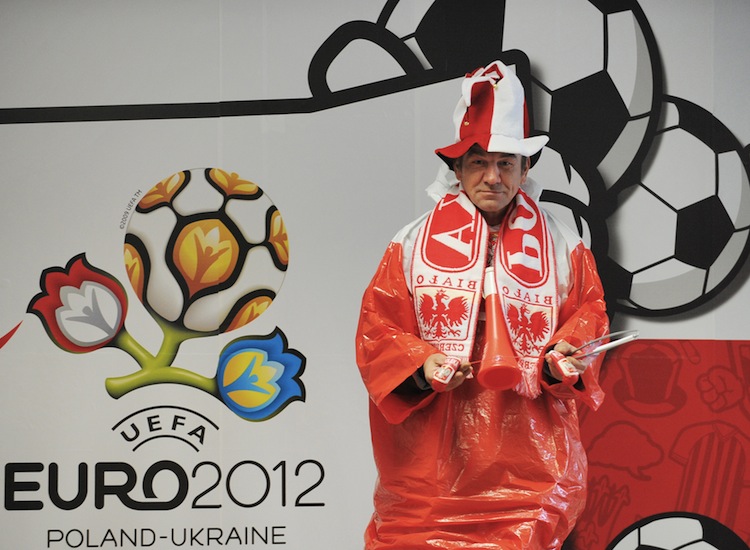UEFA’s European Football Championship 2012, commonly known as Euro 2012 or the “Euros,” is a football tournament at its finest. Taking place in Poland and Ukraine, 16 teams are divided into four groups of four with the top two from each group advancing to the quarterfinals.
In total, 31 matches will be played starting Friday, June 8, and running until the final on July 1.
More direct and without the excessive fanfare of the World Cup, the Euros get right down to business from the first kick of the ball. There are no minnows here—Poland’s May FIFA ranking is the lowest at 65, but the eastern European nation is no stranger to participation in major tournaments.
The tournament favorites are (in no particular order): defending champion Spain, 2008 finalist Germany, 2006 World Cup winner Italy, and 2010 World Cup finalist Netherlands.
But being a favorite means little at the Euros as Greece proved in 2004. The now-troubled nation with a caretaker government put together a defensive performance never before seen to triumph in Portugal.
With such a concentration of footballing powerhouses, fans are served up with World Cup semifinal caliber matches from the get-go. Some of the most eagerly anticipated group stage matches include Italy vs. Spain on June 10, France vs. England on June 11, and Germany vs. Netherlands on June 13, just to name three.
England’s Controversy
England enters Euro 2012 under a cloud of controversy surrounding manager Roy Hodgson’s decision not to select Manchester United stalwart Rio Ferdinand.
Hodgson and England’s Football Association insisted it was for “footballing reasons,” but when another central defender, Gary Cahill, had to withdraw from the squad due to a broken jaw and Ferdinand was again overlooked, it became abundantly clear that there were more than “footballing reasons” afoot.
Hodgson named John Terry, who is facing a criminal charge of using racist language toward Rio Ferdinand’s younger brother Anton, to the squad. Implicit in Hodgson’s decision is avoidance of conflict between Rio Ferdinand and Terry. The two players, under normal circumstances, could have been England’s two starting centre backs.
The omission of Ferdinand has brought on widespread questioning of Hodgson, but England’s performances on the pitch have been pragmatic. England has won its two friendlies (1–0 over both Belgium and Norway) under Hodgson. They can also consider themselves lucky in avoiding the favored teams in the group stage.
England will have to deal with France, Sweden, and Ukraine in Group D. England went down to France at Euro 2004, thanks to Zinedine Zidane’s magic, and Sweden is never a pushover. Ukraine reached the 2006 World Cup quarterfinal and will have the host nation’s support.
Rankings Confirm Group of Death
FIFA’s rankings are meant to be taken with a grain of salt. Be that as it may, Group B with Netherlands (No. 4), Denmark (No. 10), Germany (No. 2), and Portugal (No. 5) didn’t need FIFA rankings to prove what is well and truly a “Group of Death.”
With an average FIFA-ranking of 5.25 as compared to Group A’s average ranking of 29, Group C’s of 9.75, and Group D’s of 22.5, Group B is clearly the most difficult group.
Most would say Denmark’s ranking seems exaggerated, but Group B teams have won five European championships (Germany & West Germany 3, Netherlands 1, Denmark 1), which is the most of any group.
Other Groups
Likely the other group of high-interest can be dubbed the “Group of Debt” with nations Ireland, Italy, and Spain all deeply embroiled in the Eurozone’s sovereign debt crisis. Croatia, with its relatively healthy finances, rounds out the group.
While Italy and Spain jump out as favorites to move on in Group C, they face each other first, meaning should Croatia or Ireland manage to win their first match, pressure would be intense for the potential loser in the Italy–Spain match.
Group A would be considered the weakest group; however, Greece, Russia (as USSR), and the Czech Republic (as Czechoslovakia) have all triumphed in this competition. This group is truly unpredictable, which lends itself to terrific competition.
One can only hope there are no further injuries in training after lengthy seasons for the top clubs in European football. We can expect controversy, the unexpected, and most of all fantastic football from some of the best talent in the world.
Follow Rahul on Twitter @RV_ETSports
“The Epoch Times publishes in 35 countries and in 19 languages. Subscribe to our e-newsletter.







